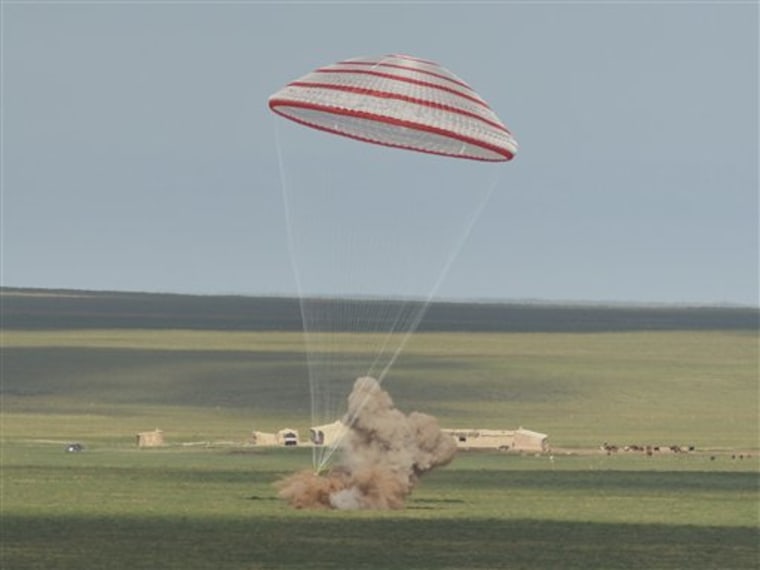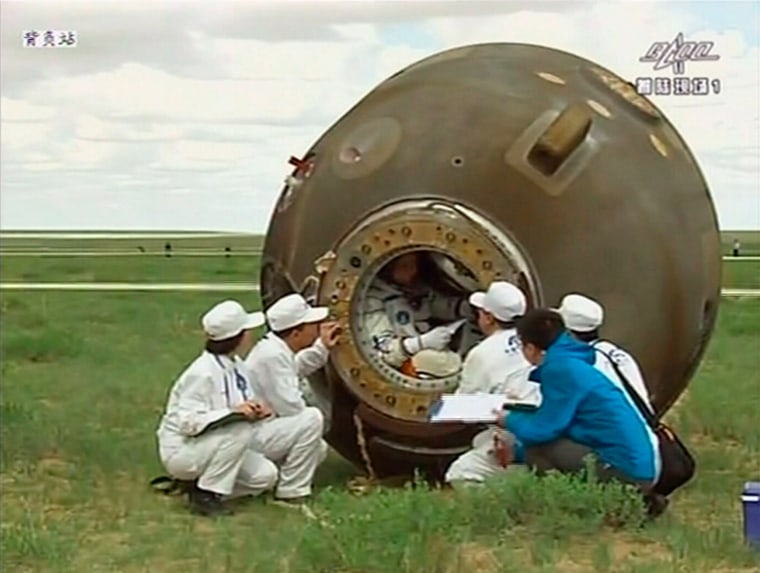BEIJING — A Chinese space capsule with three astronauts safely landed Wednesday on the country's northern grasslands after a 15-day trip to a prototype space station, marking the latest success for China's manned space program as it enters its second decade.
The Shenzhou 10's descent module landed by parachute in the vast territory of Inner Mongolia early Wednesday with the three crew members smiling and waving on live television after wriggling through the blackened capsule's narrow hatch.
"Space is our dream, the fatherland is our home. Thanks to all compatriots who supported us and best wishes for the wealth and success of our fatherland and the ever greater happiness of our people," mission commander and two-time space traveler Nie Haisheng said to the cameras.
China's first class in space
Wang Haiping, China's second female astronaut to complete a mission, said the trip had been especially worthwhile for the opportunity to conduct China's first science class in space, beamed live to 60 million schoolchildren across the country.
"I hope all our young friends may wish beautiful dreams, and may their dreams come true," said Wang, who, like her two colleagues, was still clad in her spacesuit and seated under bright sunshine in white folding chairs in front of the round-edged module.

Back at the Beijing command center, manned space program director Zhang Youxia declared the mission a "complete success" and said all three astronauts were in perfect health.
He was followed by the Communist Party's seventh-ranking official, Zhang Gaoli, who conveyed congratulations from the party leadership and declared that the manned program was entering a new and more challenging stage.
The program has "tremendous significance for the advance of our country's economic and technological strength and ethnic unity, and displays the great Chinese path, spirit, and power," Zhang said.
A decade of space pride
China's military-backed space program is a source of massive national pride and the successful mission stands as the latest milestone in the party's smooth consolidation of support under its new leader, President Xi Jinping, who also commands the armed forces.
China sent its first astronaut into space in 2003, becoming the third nation after Russia and the U.S. to achieve manned space travel independently, and has powered ahead in a series of methodically timed steps. Meanwhile, the American program, now in its sixth decade of putting people into space, routinely works on the International Space Station and has long-term plans to go to an asteroid and Mars.
The latest Chinese mission was the second crewed trip to the Tiangong 1 experimental space station, launched in 2011. It's due to be replaced by a three-module permanent station, Tiangong 2, seven years from now.

The future station will weigh about 60 tons, slightly smaller than NASA's Skylab of the 1970s and about one-sixth the size of the 15-nation International Space Station. China was barred from participating in the International Space Station, largely because of U.S. objections over political differences and the Chinese program's close military links.
Alongside the manned program, China is developing the Long March 5 heavier-lift rocket needed to launch the Tiangong 2. It also plans to send a rover to the moon, possibly followed by a crewed lunar mission if officials decide to combine the human spaceflight and lunar exploration programs.
Copyright 2013 The Associated Press. All rights reserved. This material may not be published, broadcast, rewritten or redistributed.